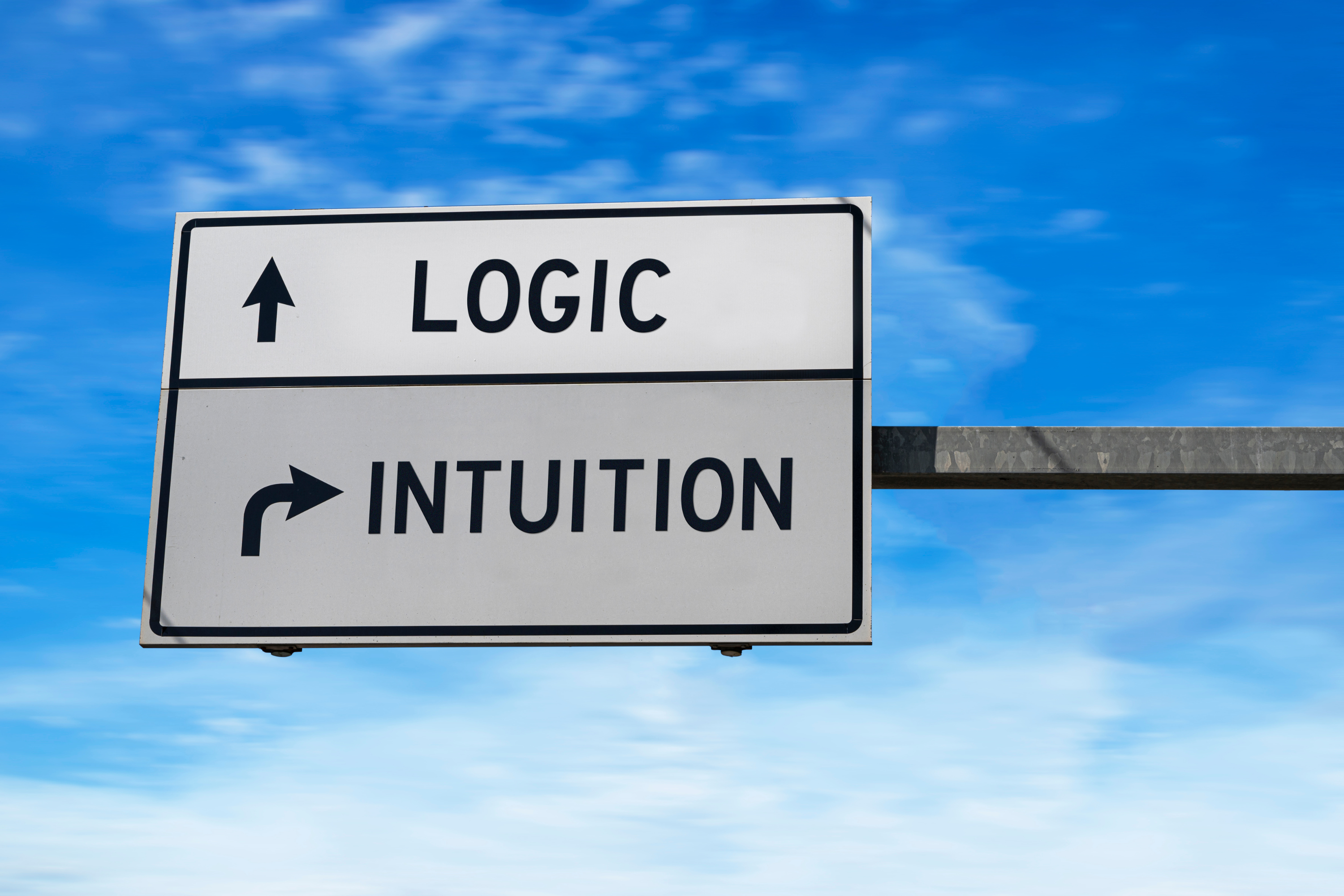In order to discuss intuition we must first define it. According to Oxford Languages, intuition is "the ability to understand something instinctively, without the need for conscious reasoning". In other words, intuition comprises all types of cognition that do not rely on reasoning. So what is reasoning? According to Oxford Languages, it is "the action of thinking about something in a logical, sensible way." Therefore, a possible interpretation of intuition would be "all types of thinking that do not rely on logic."
The next step into answering this question is to examine the logic. Logic is a rigorous system of rules that dictate how it is possible to arrive at conclusions when given certain premises. For instance:
● If A[1] implies B, and A is true, B is true.
● If A is true, then A or B is true.
● If A or B is true, and A is false, B is true.
● If A is not false, A is true.
● If we assume that A is true and arrive at the conclusion that B is true, A implies B.
● If we assume that A is true and arrive at the conclusion that B is both true and false, A is false.
But is logic better than intuition at arriving at valid conclusions given valid premises? It cannot be proven that logic is infallible. If we attempt to prove that logic is infallible without the premise that logic is infallible, the conclusion is not necessarily valid, for if logic is infallible, even a sound proof with valid premises can lead to invalid conclusions. But if we assume that logic is infallible when attempting to prove that logic is infallible, our proof boils down to "logic is infallible if logic is infallible", which is a tautology. Therefore, we cannot say for certain that logic is better than intuition.
However, this does not disprove MacIntyre's conjecture. He does not say that the use of intuition is worse than logic, he says that the use of the word intuition shows that something has gone badly wrong with an argument. An argument is a reason or a set of reasons. Reasons require reasoning, and intuition is defined as that which does not require reasoning. Therefore, MacIntyre is right in that an argument that relies entirely on intuition has gone badly wrong.
However, this does not show that an argument that relies partly on intuition has gone badly wrong. Consider the trolley problem. You have the choice to run over one person or five people with a trolley. A utilitarian argument for running over one person might be the following:
● Premise 1: I should always attempt to minimize pain.
● Premise 2: For each person run over by a trolley, a constant amount of pain is caused.
● Step 1: Therefore, more pain will be caused if I run over five people than if I run over one person.
● Step 2: Therefore, by running over one person, I will minimize pain.
● Step 3 / Conclusion: I should run over one person.
To arrive from the premises to step one, or from one step to another, logic is required. If logic is replaced with intuition here, the argument "has gone badly wrong" as it no longer relies on reason, which it must do by definition. However, that is not the only place where intuition can be used. Let us examine the premise "I should always attempt to maximize pleasure and minimize pain". One could create an argument for this, such as:
● Premise 1: Pain is bad.
● Premise 2: Bad things should always be minimized.
● Conclusion: I should always attempt to minimize pain.
And what is the reason why pain is bad? This could be proven using other premises, and I could call one of those premises into question. Given that the human mind cannot hold infinite information, and one cannot end up in a loop, as one would then be assuming what one sets out to prove, one would eventually arrive at a premise that does not have any premises backing it up: an axiom. Since logic can only be used to arrive at a conclusion if there are premises, this axiom cannot be logically proven. This means that we have generated these axioms through thinking that does not rely on logic, which according to our definition, is intuition.
Now we can answer the original question. Moral philosophy is not possible without intuition, as axioms rely on intuition. Therefore, at least in this context, the introduction of the word 'intuition' would not be a signal that something had gone badly wrong with an argument.
It is possible that MacIntyre did not have this use of intuition in mind, but merely the use of intuition to go from a premise to a conclusion, which we have shown to be a signal that something has gone badly wrong with an argument. However, the quote includes the word "always". This means that, regardless of which use MacIntyre had in mind, any use of intuition which does not signify that an argument has gone badly wrong, for instance in the situation mentioned in the previous paragraph, disproves MacIntyre's conjecture.
It is also possible that MacIntyre has a different definition of intuition in mind. Perhaps my definition of intuition as any method of generating thought that does not rely on logic is broader than MacIntyre's definition. Perhaps the example of using intuition to arrive at an axiom does not qualify as intuition according to his definition. Perhaps he even precisely defines intuition before or after this quote in a way that shows this. However, the quote simply refers to the word 'intuition'. It does not matter how MacIntyre defines it, it matters how the moral philosophers who use the word define it.
I suppose it is possible that every single time a moral philosopher has used the word intuition, they used it in an argument that went badly wrong. However, I find that hard to believe. Moral philosophers are professionals with decades of experience in analyzing and formulating philosophical conjectures. And we now know that there is at least one context where the word intuition does have a use in moral philosophy. Therefore, MacIntyre's conjecture seems unlikely to hold true in all cases.
In the same way that I am giving moral philosophers who use the word intuition the benefit of the doubt, I also do not think that MacIntyre is saying complete nonsense. He is probably referring to a context he has often come across where moral philosophers have used the term intuition in arguments that have gone badly wrong. However, in order for this quote to hold true, he would have to change it slightly. I can think of three possible ways:
- "[MacIntyre's definition of intuition] [...] The introduction of the concept of intuition as I have defined it by a moral philosopher is always a signal that something has gone badly wrong with an argument."
- "The use of intuition by a moral philosopher to go from premise to conclusion is always a signal that something has gone badly wrong with an argument."
- "The introduction of the word 'intuition' by a moral philosopher is often a signal that something has gone badly wrong with an argument."
[1] A and B represent statements that can be either true or false, such as "humans can fly" or "Socrates is a human"

